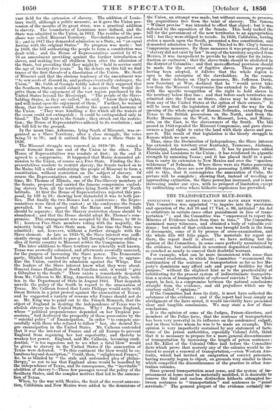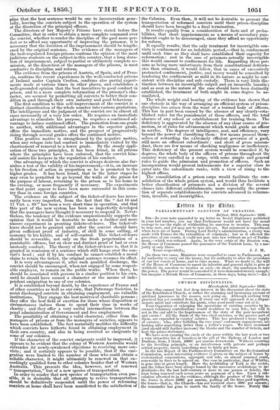THE Committee was appointed "to inquire into the provisions and
operation of the Act 16 and 17 Viet. c. 99, intituled An Act to substitute in certain cases other punishment in lieu of trans- portation' " ; and the Committee was "empowered to report the Minutes of Evidence taken from time to time." The Committee examined many witnesses, and obtained a body of valuable -evi- dence; but much of that evidence was brought forth in the form of documents, some of it by process of cross-examination, and the whole 611 s 461 folio pages. The materials for report are there, the report itself is absent ; we have nothing but the opinion of the Committee, in some cases perfectly unsustained by the evidence, but embodied in seventeen dogmatical resolutions, so couched as nearly to conceal their doubtful warrant.
For example, what can be more inconsistent with sense than
the second resolution, in which the Committee "recommend the continuation of the sentence of transportation as far as her Ma- jesty's dominions may afford safe andproper facilities for that purpose," without the slightest hint as to the practicability of substituting for the present system of indiscriminate transporta- tion a system of transportation of reformed convicts ? The whole report, in fact, is a compromise between the natural .conclusions straight from the evidence, and old prejudices which are by courtesy called " opinions."
If the Committee had done its duty, it must have collected the substance of the evidence ; and if the report had been simply an abridgment of the facts stated, it would inevitably have presented clear and tangible conclusions. We may state a few of those conclusions.
• It is the opinion of some of the Judges Prison-directors and members of the Police force, that the sentence of transportation
has been very powerful in its influence on the condemned culpfi and on those before whom he was to be made an example. opinion is very imperfectly sustained by any statement of fads. Some of the prison authorities, especially Colonel Jebb, think that it is necessary to prepare for a more general-discontinuance of transportation by increasing the length of prison sentences ; and Mr. Elliot of the Colonial Office laid before the Committee facts which prove that scarcely any of the colonies would be in- duced to accept a renewal of transportation,—even Western Aus- tralia, which had invited an emigration of convict prisoners, having recently begun to object, on grounds very similar to those which compelled the discontinuance of the practice in other Aus- tralian colonies.
Since general transportation must cease and the system of im-
prisonment at home must be materially modified, it is desirable to remove the frail and useless distinction hitherto attempted be- tween sentences to "transportation" and sentences -to penal -servitude." The general purport of the evidence certainly
mi- is plies that the best sentence would be one to incarceration gene- rally, leaving the convicts subject to the operation of the system at the discretion of the principal officers.
The directors of her 'Majesty's Prisons have stated before the Committee, that in order to obtain a more complete command over the convict, whether to render the discipline of the gaol more per- fect or to afford any epportmity of improving the prisoner, it is necessary -that the duration of the imprisonment should be length- ened by the original sentence. The evidence of the managers of the best-regulated foreign prisons confirms the opinion of the most judicious students on the subject in this country, that a long dura- tion of imprisonment, subject to partial or ultimately: complete re- mission, at the discretion of the managers of the prisons, is most conducive to discipline and reform.
The evidence from the prisons of Austria, of Spain, and of Prus- sia, confirms the recent experiences in the well-conducted prisons of Ireland under Captain Crofton, confirms also partial experi- ments made at various times in other places, and establishes a well-grounded opinion that the best incentives to good conduct in prison, and to a more complete reformation of the prisoner's cha- racter, are secured by permitting all convicts to better their con- dition in gaol through their own industry and good behaviour. The first condition to this self-improvement of the convict is a distinct classification of the whole number into various gradations. The intelligence and the judgment of the convict are in almost all eases necessarily- of a very low order. He requires an immediate advantage to stimulate his purpose, he requires a continued ad- vantage to induce continued effort. The promotion from one grade to another, with additional advantages in the superior grade, offers the immediate motive, and the prospect of progressively rising through several grades offers the continued motive.
This positive motive is strengthened by the negative motive, when any relapse into bad conduct is immediately, visited by the chastisement of removal to a lower grade. By the steady appli- cation of these two principles it has been found, in all prisons where the principles have been enforced, that the convict him- self assists his keepers in the regulation of his conduct. One advantage of which the convict is always desirous also fur- nishes a test of the -validity of his improvement,—it is, an increase -to his freedom of action in proportion as he is promoted to the higher grades. It has been found, that in the latter stages he may even be permitted to go beyond the walls of the prison for the purpose of labour, returning to the prison as to his home in the evening, or more frequently if necessary. The experiments on that point appear to have been more successful in this coun- ty than in some foreign countries. The evidence on the subject of the ticket-of-leave has neces- sarily been very imperfect, from the fact that the "Act 16 and 17 Viet. c. 99" has been a very short time in operation, and that this part of the new system has been so imperfectly developed that the managers have thought it necessary to suspend it. Never- theless, the tendency of the evidence unquestionably supports the opinion that it would be desirable to make a further and more sincere experiment in granting tickets-of-leave. The ticket-of- leave should not be granted until after the convict should have given sufficient proof of industry, of skill in some calling, of economy in his habits, and of self-control. This ticket-of-leave should be revocable, not only on the fresh perpetration of a punishable offence, but on clear and distinct proof of bad or even unsteady. conduct. The theory of the ticket-of-leave is, that it is granted in remission of a sentence which still hangs over the con- vict's head ; and if by his conduct he cannot establish a moral claim to retain the ticket, the original sentence resumes its effect.
It is very advantageous if, after such qualified discharge, the convict should be encouraged, when not engaged by some respect- able employer, to remain on the public works. When there, he should be associated with persons in a similar position to his own, until he should have earned a character or the means of inde- pendent emigration to one of our colonies.
It is established beyond doubt, by the experience of France and of other countries as well as our own, that Patronage Societies, to assist discharged convicts in obtaining employment, are valuable institutions. They engage the best motives of charitable persons ; they offer the best field of exertion for those whose disposition or circumstances induce them to spend their time in works of charity ; and they offer a very useful intermedium between the penal administration of Government and free employment.
The possibility of obtaining a valid character, either from the managers of prisons or from the managers of societies, appears to have been established. The fact materially modifies the difficulty which convicts have hitherto found in obtaining employment in their own country, and also in being received as emigrants by some of our colonies.
If the character of the convict emigrants could be improved, it appears to be evident that the colony of Western Australia would surrender itff newly-awakened objections to receiving more con- victs; and it certainly appears to be possible, that if the emi- gration were limited to the number of those who could obtain a reliable character, it might ultimately be renewed in that ex- ceedingly qualified form to other colonies besides thet-of Western Australia. This presents the idea, however, not of renewed "transportation," but of a new species of transportation.
In order to render that new species of transportation even pos- sible, it is desirable that all attempts to revive transportation shocl be definitively suspended until the power of reforming Convicts at home shall have been manifested to the satisfaction of the -Colonies. Even then, it will not be desirable to prevent the transportation of reformed convicts until their prison-discipline should have been brought to a final termination. It results equally from a consideration of facts and of proba- bilities, that short imprisonments as a means of secondary pun- ishment ought to be discouraged, since they afford no opportunity for reform.
It equally results, that the only treatment for incorrigible con- victs is confinement for an indefinite period,—that is, ' confinement until such time as they shall have established then capacity for reformation; and in the case of prisoners actually incorrigible this would amount to confinement for life. Regarding these per- sons as being more unfortunate from their constitutional deficien- cies than criminal, it would follow, that in oases of excessively protracted confinement, justice, and mercy would be consulted by rendering the confinement as mild in its nature as might be con- sistent with discipline and safe custody. There is vary little dis- tinction between an incorrigible culprit and an incurable lunatic; and as soon as the nature of the ease should have been distinctly established, the treatment of both might in some degree be as- similated.
The whole weight and bearing of the evidence has shown that one obstacle in the way of arranging an efficient system of prison- discipline has arisen from the want of a trained body of officers. This has in part been caused by the absence of any clearly-esta- blished rules for the punishment of those officers, and the total absence of any school or establishment for training them. The deficiency is aggravated by the absence of any clear course of pro- motion, or of rules for advancement which would guide an officer in service. The degrees of intelligence, zeal, and efficiency, vary beyond the power of classifying them : few means present them-
yes of rewarding the extremely efficient governor of a gaol, still more an efficient subordinate ; and short of gross miscon- duct, there are few means of checking negligence or ineffidenoy. This deficiency of the present system would be remedied if, by degrees the whole body of the officers of prisons throughout the count.; were enrolled as a corps, with some simple and genera rules to guide the admission and promotion of officers. Such an incorporation would present inducements for a superior class to enter into the subordinate ranks, with a view of rising to the highest offices. The consolidation of a prison corps would facilitate the con- solidation of the whole prison system, and would thus facilitate a better classification of prisoners and a division of the several classes into different establishments, more especially the promo- tion of separate establishments for convicts advanced reforma- tion, invalids, and incorrigibles.



































 Previous page
Previous page